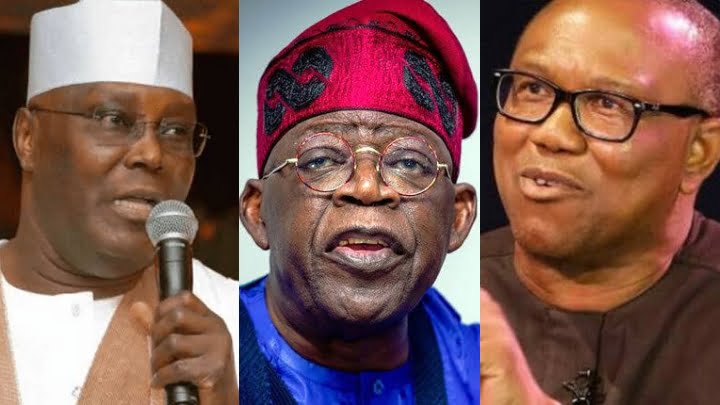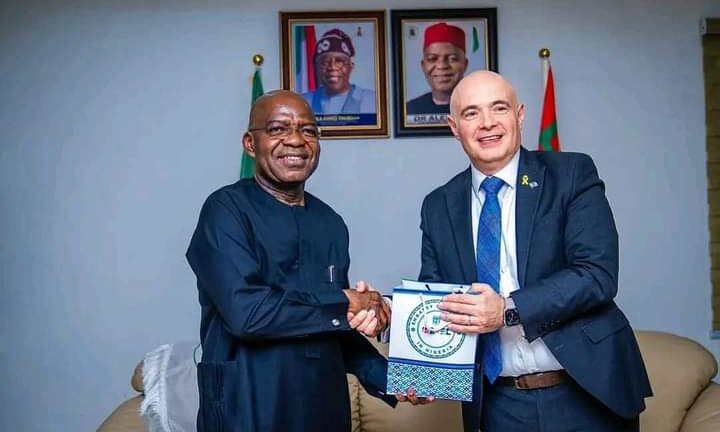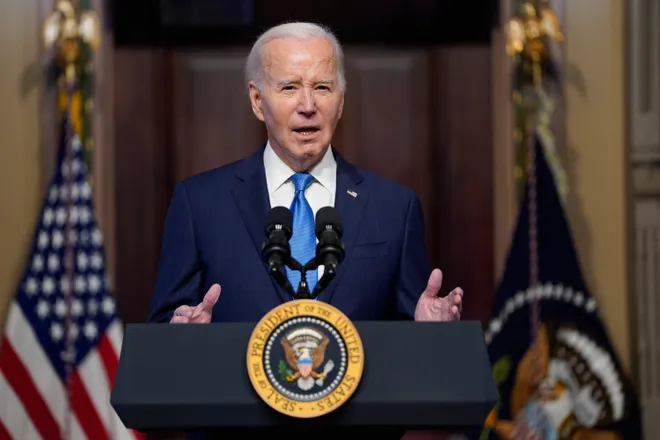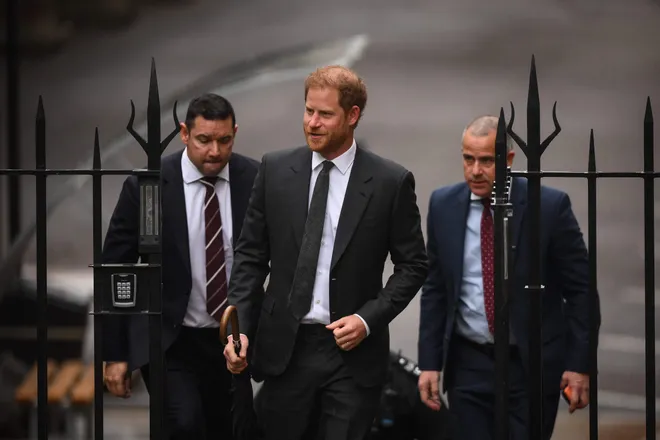
The Presidential Election Petition Court in Abuja will today (Wednesday) deliver its much-anticipated, high-stake judgement on three petitions challenging the election of President Bola Tinubu.
Mr Tinubu’s win as the candidate of the All Progressives Congress (APC) in the 25 February has been eclipsed by the opposition’s allegations of fraud in the process that was eagerly monitored around the world.
There are three pending petitions filed in court in the aftermath of the election challenging the credibility of Mr Tinubu’s victory which the five-member panel of the court will decide on today.
Two of the petitions were filed by the leading opposition presidential candidates – Atiku Abubakar of the Peoples Democratic Party (PDP), who came second behind Mr Tinubu, and Peter Obi of the Labour Party, who took the third position, according to the Independent National Electoral Commission (INEC).
A total of 18 candidates contested the election.
The third petition was filed by a political party, the Allied Peoples Movement (APM), whose presidential candidate, Chichi Ojei, scored 25,961 votes out of the over 28 million votes cast during the election.
There were two other petitions filed by the Action Peoples Party (APP) and the Action Alliance (AA) at the court before the close of the window for filing presidential election petitions in March but were withdrawn before hearing began.
The two separate but typical petitions filed by Atiku and Mr Obi, centre on election and pre-election issues.
They attacked the qualification of Mr Tinubu to contest the election, the legality of the nomination of his running mate, the integrity of the election process, and the threshold of the spread of votes used by INEC to declare Mr Tinubu as the winner of the poll.
Both Atiku and Mr Obi individually asked the court to either declare them the winner of the election or order a fresh poll. Should the court choose to order a fresh election, they prayed that Mr Tinubu and his party, the APC, should be barred from participating in it.
The APM did not claim to have won the election. Its petition, anchored on the sole ground of alleged double nomination of Mr Tinubu’s running mate and present-day Vice President, Kashim Shettima, sought the cancellation of APC’s votes and declaration of Atiku the winner of the poll.
Mr Tinubu was inaugurated as Nigeria’s 16th leader in May, three months after the disputed election, while the opposition candidates continued to wage a legal challenge to his victory in court.
The court’s judgement, which will be televised live, is a high-stake decision that will get attention beyond Nigeria.
At home, with the broad spectrum of interests fixated on the cases since March, the judgement, whichever way it goes, will impact heavily on public confidence in the judiciary, and INEC alongside its heavily funded technological tools it deployed nationwide for the first time during the 2023 elections.
Also, Mr Tinubu’s election as Nigeria’s president, which the court is going to decide on today, goes to the root of his standing as the chair of the West African regional body, ECOWAS.
Many within and outside Nigeria are also looking forward to the judgement as the basis for reassessment of his credibility as a critical voice on the African continent, which is seeing a new wave of disputed elections followed by coups in different African countries.
The judgement is coming at a time when Mr Tinubu’s advocacy for entrenchment of democratic rule in Africa is resonating across Africa and the world.
PREMIUM TIMES is on the ground to provide you with live updates as the judgement is being delivered by the five-member panel of the court in Abuja today.
Ruger. “So na wetin you dey hide since” – Reactions as Ruger mistakenly exposes face without eyepatch
The panel of five judges comprising four men and a woman is led by Haruna Tsammani (63).
The other members are: Stephen Adah (65), Misitura Bolaji-Yusuf (63), Moses Ugo (57), and Abba Mohammed (62).
The five-member bench is scheduled to begin its judgement at 9 a.m.
Atiku and Mr Obi anchored their petitions on, among other claims, that Mr Tinubu was not qualified to contest the election, citing discrepancies in his academic records and previous judicial indictment.
The petitioners alleged that Mr Tinubu was not eligible to contest the 25 February election after a 1993 decision of the United States District Court, Northern District of Illinois, Eastern Division, ordering him to forfeit $460,000 in a case involving drugs trafficking.
The petitioners similarly alleged that Mr Tinubu’s running mate, Mr Shettima, was illegally nominated for two separate constituencies in the same election cycle – as Borno Central senatorial candidate and vice-presidential candidate for the whole of Nigeria – therefore rendering their joint ticket invalid.
The petitioners also alleged widespread suppression of votes as well as manipulation and alteration of results to favour Mr Tinubu in, cumulatively, more than 25 states of the federation.
According to the leading opposition candidates, the election was also marred by the failure of INEC to upload photographic copies of polling unit results on its Results Viewing (IReV) portal promptly as stipulated in the election guidelines.
They also complained that Mr Tinubu failed to meet full constitutional requirements to be declared the winner of the election because of his failure to secure 25 per cent of the votes in the Federal Capital Territory (FCT), Abuja.
Mr Tinubu’s opponents said by failing to secure 25 per cent of the votes in the federal capital, he did not meet the full constitutional requirement to be declared the winner, an issue that they gave an extraordinary stress at the hearing of the cases.
But INEC, Mr Tinubu, and the APC urged the court to dismiss the petitions on the grounds that they were founded on wrong legal interpretations while the petitioners also failed to provide evidence to substantiate alleged irregularities and results manipulations.
8.47 a.m: Vice-President Kashim Shettima has arrived at the courtroom ahead of the judgement scheduled to begin at 9 a.m.

The National Security Adviser (NSA), Nuhu Ribadu; APC National Chairman, Abdullahi Ganduje; Nasarawa State Governor, Abdullahi Sule and his Bauchi State counterpart, Bala Mohammed are also seated in court ahead of the verdict.

8.54 a.m: Some APC governors, including Governors Yahaya Bello of Kogi State, Hope Uzodinma of Imo State, and Mai Mala Buni of Yobe State, have arrived at the courtroom.
8: 53 a.m: Another APC governor, Governors Biodun Oyebanji of Ekiti Ekiti State also arrived with his Kogi, Imo and Yobe counterparts.
8:59 a.m: Aviation Minister, Festus Keyamo, arrives court.
9.06 a.m: Vice-President Shettima exchanges pleasantries with lawyers as he finds his way to his seat.

9.27a.m: The five judges file in and take their seats.
The proceedings will begin any moment from now.
9.28 a.m: The head of the five-member bench, Haruna Tsammani, welcomed everyone to the packed courtroom.
He describes the proceedings as “the zenith” of the hearing.
He says the judgement on the three cases is lengthy and may take few hours.
9.31 a.m: The panel is to begin with Peter Obi’s case.
A court official announces the case and the party.
9.32. a.m: Vice-President Kashim Shettima represents President Tinubu and himself.
9.33 a.m: Julius Abure, the chair of the Labour Party, represents the party. Mr Obi is absent.
9.35 a.m: Abdullahi Ganduje, the chair of APC, represents the party.
9.37 a.m: The lead counsel for the Labour Party and Mr Obi, Livy Ozoukwu, announces his appearance and the names of other lawyers with him.
9.38a.m: Stephen Adehi, a SAN, announces appearance for INEC.
9.39a.m: A.A Malik, a SAN, announces for Mr Tinubu.
9.40 a.m: Charles Edosomwan, a SAN, announces appearance for the APC
9:42 a.m: Court official calls APM petition against President Bola Tinubu.
9: 43 am: May Agbamuche-Mbu announces representation for INEC
9: 44 a.m: Vice-President Shettima stood up for recognition. Abdullahi Ganduje announces representation for APC.
9: 45 a.m: APM lawyer announces appearance.
9.48 a.m: Charles Edosamwan, SAN, announces appearance for APC.
9: 49 a.m: A A Malik announces appearance for Mr Shettima and APC.
9.52 a.m: Court official calls the third case – Atiku’s case.
9:52 a.m: PDP’s Acting National Chairman, Umar Damagum, announces self as representatives of Atiku and his party.
9:55 a.m: Chris Uche (SAN) announces legal representation for Atiku and PDP.
9.56 a.m: Stephen Adehi, a SAN, announces his team’s appearance for INEC.
9: 58 a.m: AA Malik, a SAN, announces appearance for Mr Tinubu.
9: 59 a.m: Charles Uwensuyi-Edosomwan announces appearance for APC
10.00 a.m: The head of the five-member bench, 63-year-old Haruna Tsammani, says the court will begin the judgement on petition No. 4, the APM’s case.
10.04 am: APM argues that Vice-President Shettima was not qualified to contest the 25 February presidential election as Mr Tinubu’s running mate as his nomination violated Section 35 of Electoral Act 2022, and other constitutional provisions.
The party prays the court to void the votes polled by the APC in the election.
10.06 a.m: APM urges the court to declare the candidate with the next highest scores as the winner of the election.
10.08 a.m: Mr Tsammani highlights applications filed by the respondents requesting that some paragraphs of APM’s petition be struck out.
10.10 a.m: Mr Tsammani clarifies that the court is sitting as the Court of Appeal and not as a tribunal.
10: 15 a.m: Mr Tsammani highlights respondents’ argument that the APM cannot introduce a new issue or fact after the petition was filed.
10.15 a m: INEC had complained against APM’s introduction of new facts during the hearing of its petition.
10: 26 a.m: Mr Tsammani says it is clear that the claim of qualification or non-qualification is a pre-election matter.
10.32 a.m: Mr Tsammani says the issue of disqualification raised by the APM in its petition ought to have been ventilated at the Federal High Court. He says the presidential election court does not have jurisdiction to hear it.
10.38 a.m: Mr Tsammani also highlights the respondents’ objection that the issue raised by APM ought to have been raised at the Federal High Court within 180 days from 27 July 2022 when Mr Shettima as the APC’s vice-presidential candidate. The window for the litigation on such issue, the respondents say, lapsed in January 2023.
10: 42 a.m: The issue of qualification of a candidate of a political party is not an all comers’ affair – Mr Tsammani.
He adds that the internal affair such as the nomination of a candidate of a political party is not the business of another political party.
10:44 a.m: Mr Tsammani says it is clear that APM only has the right to file the complaint raised in its petition when the nomination of a candidate by another party affects it.
In the instant case, the petition is incompetent and ought to be struck out for lacking in merit, the judge adds.
10.50 a.m: Mr Tsammani now begins considering APM’s substantive petition on merit.
Mr Tsammani notes that after the pre-hearing session, the APM opened and closed its case with one witness on 21 June 2023.
He says none of the respondents called any witness, but only tendered some documents from the bar.
10.53 a.m: Mr Tsammani says it is clear that the APM’s petition is anchored on the non-qualification of Vice-President Shettima.
10.56 a.m: Mr Tsammani says the APM’s case centres on the allegation that while Mr Shettima was still the APC’s Borno Central senatorial candidate, he was nominated by the party and he did accept the nomination of the vice-presidential candidate of the part
He says that the APM argued that this amounts to double nomination which is illegal and leads to disqualification.
10.58 a.m: Mr Tsammani sets out the constitutional requirements for qualification to run for the presidency:
– The person must be a citizen of Nigeria by birth.
– The person must be 40 years old or above.
– The person must be a member of a political party.
– The person must be sponsored or nominated by that political party.
– The person must be educated to the level of a secondary school certificate or its equivalent.
11.02 a.m: Mr Tsammani says the NIgerian constitution having established the qualifying and disqualifying factors, no court can create other qualifying or disqualifying factors. He says the Supreme Court has followed this principle in all cases.
11.09 a.m: Mr Tsammani notes that the issue of double nomination of Mr Shettima has been resolved by the Supreme Court.
He rejects the argument of the APM that it has the right to relitigate the issue at the presidential election petition court because it was not a party to the case decided by the Supreme Court.
The panel chairman says it is clear that the APM was not a party to the case, but is also clear that the same issue raised in the instant petition was the same issue the Supreme Court resolved in the earlier case.
He also rejects the APM’s argument that the issue was not resolved in the lead judgement of the Supreme Court, explaining that a supporting judgement in which the matter was resolved is binding.
11:20 a.m: Mr Tsammani says it is clear to from the oral and documentary evidence that the APM has not established the allegation of double nomination against Mr Shettima.
11.23 a.m: Mr Tsammani says there is nothing in the Nigerian constitution that stops a presidential candidate from replacing his running mate within 90 days, and there is also nothing that invalidates the nomination of the substitute within the stipulated period.
11.24 a.m: He resolves the sole issue of double nomination of Mr Shettima against the petitioner. He says it means the petition lacks merit.
11.27a.m: The panel goes on break for 15 minutes.
11:42: Court resumes sitting.
11:45 a.m: One of the five-member panel of Justices, Abba Mohammed, reads ruling on preliminary objections filed by the respondents against Peter Obi’s petition.
12: 06 p.m: Mr Mohammed highlights a contention by the respondents that Mr Obi’s petition only alleged widespread irrectularities without giving the particulars and in which polling units.
He says the petition stated that fictitious results were uploaded without stating the affected polling units.
He says the petition alleged overvoting and rigging without stating in which polling units they took place.
The petitioners only made generic allegations, Mr Mohammed says.
12.12 p.m: The petitioners made generic allegations of irregularities and said they would rely on spreadsheets, inspection reports and forensic analysis filed with the petition during trial.
But he says the documents promised by the petitioners were not attached to the petition and served on the respondents.
12.20 p.m: Mr Mohammed also says Mr Obi and his Labour party failed to provide particulars of corrupt practices, suppression of votes, entry of fictitious results and other irregularities in their pleadings.












